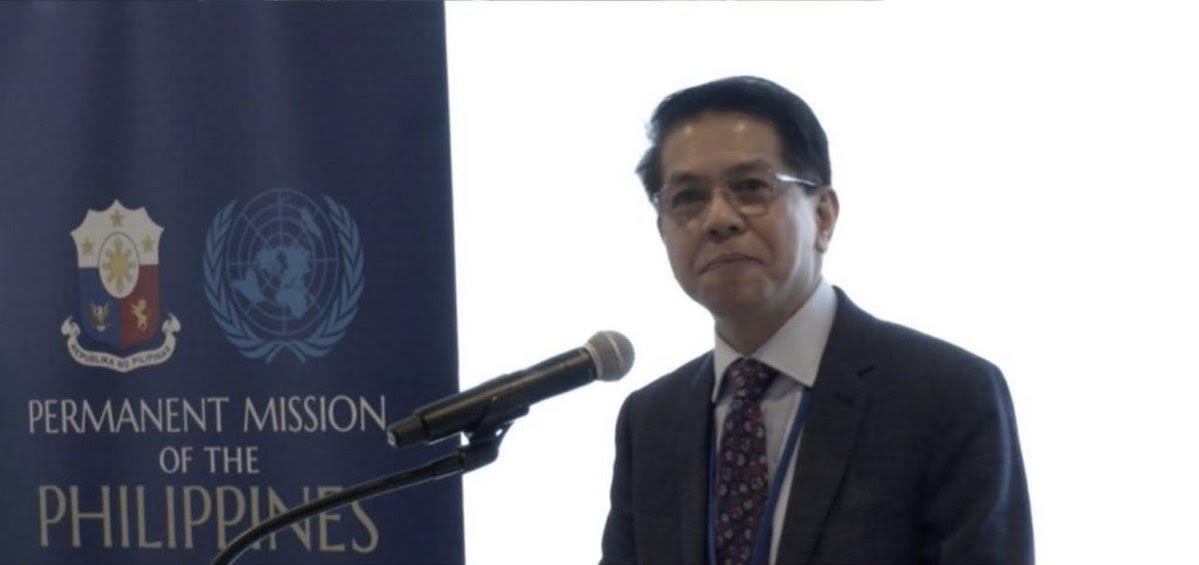
Deputy Administrator Efren Carandang, the Philippines’ candidate to the UN CLCS. PHOTO FROM PH MISSION TO UN’S TWITTER ACCOUNT
MANILA, Philippines—The Philippines secured a seat in a United Nations body tasked with facilitating implementation of the UN Convention on the Law of the Sea (Unclos) after the country’s candidate got the backing of 113 state parties.
The Philippines is now in the Asia-Pacific Group (APG) of the UN Commission on the Limits of the Continental Shelf (CLCS) for a term that will start in 2023 until 2028, the Philippine Mission to the UN said in a statement on Twitter on Thursday (Manila time).
“[The Philippines] competed with eight other candidates under the APG, and successfully reached the required majority of votes, with 113 votes from a total of 164 state parties present and voting, after four tough rounds of voting,” the Philippine Mission added.
Manila’s candidate, Deputy Administrator Efren Carandang, was described as one of the Philippines’ “most eminently qualified technical expert[s] for the CLCS, with quality management skills.”
This is the first time that the Philippines, an archipelagic country, will have a seat in the UN commission, according to the mission.
The election of a Filipino diplomat to the UN body “promotes the principle of rotation, inclusion, and representation among Unclos states,” the mission added.
The CLCS is tasked with facilitating “implementation of the [Unclos] in respect of the establishment of the outer limits of the continental shelf beyond 200 nautical miles (M) from the baselines from which the breadth of the territorial sea is measured,” according to the CLCS website.
“Under the convention, the coastal state shall establish the outer limits of its continental shelf where it extends beyond 200 M on the basis of the recommendation of the commission,” it added.
“The commission shall make recommendations to coastal states on matters related to the establishment of those limits; its recommendations and actions shall not prejudice matters relating to the delimitation of boundaries between states with opposite or adjacent coasts,” it further read.
Locsin ‘disappointed’ at Australia, thanks China
Philippine Foreign Affairs Secretary Teodoro Locsin Jr. expressed disappointment at Australia’s failure to support the Philippine candidate to the UN commission.
“I am extremely disappointed Australia cannot support our candidature to the CLCS. Stuck out my neck for AUKUS (Australia-United Kingdom-United States alliance),” Manila’s top diplomat was quoted as saying in a tweet by the Department of Foreign Affairs (DFA).
SFA Locsin @teddyboylocsin: I am extremely disappointed Australia cannot support our candidature to the CLCS. Stuck out my neck for AUKUS. Thought we were partners in upholding rules-based order in the maritime domain. Come through for us.@AusAmbPH pic.twitter.com/HyfvNlh7dP
— DFA Philippines 🇵🇭 (@DFAPHL) June 15, 2022
“Thought we were partners in upholding rules-based order in the maritime domain. Come through for us,” he added.
RELATED STORY: ‘We continuously assess’ AUKUS security pact, says PH during Asean meet
The DFA chief, meanwhile, thanked China for its vote.
“Thank you China for your vote. We have differences, sure; we tried but failed to bridge them but the endeavor was sincere; we are patriots [to] each of our respective causes; but we have a deep respect and genuine affection for each other,” Locsin said in a tweet.
Thank you China for your vote. We have differences, sure; we tried but failed to bridge them but the endeavor was sincere; we are patriots each of our respective causes; but we have a deep respect and genuine affection for each other. https://t.co/xuiiPUit44
— Teddy Locsin Jr. (@teddyboylocsin) June 16, 2022
The Philippines has long been locked in a maritime dispute with China. In 2016, Manila won an arbitral award that invalidated Beijing’s expansive claims in the South China Sea, including parts of the West Philippines Sea.
PH wins arbitration case over South China Sea
China, however, has repeatedly brushed off the arbitral ruling.
In recent weeks, Manila, invoking the arbitral award as well as the Unclos, has been lodging diplomatic protests against Beijing’s actions in Philippine waters, including the presence of Chinese vessels inside Philippine waters in the West Philippine Sea.